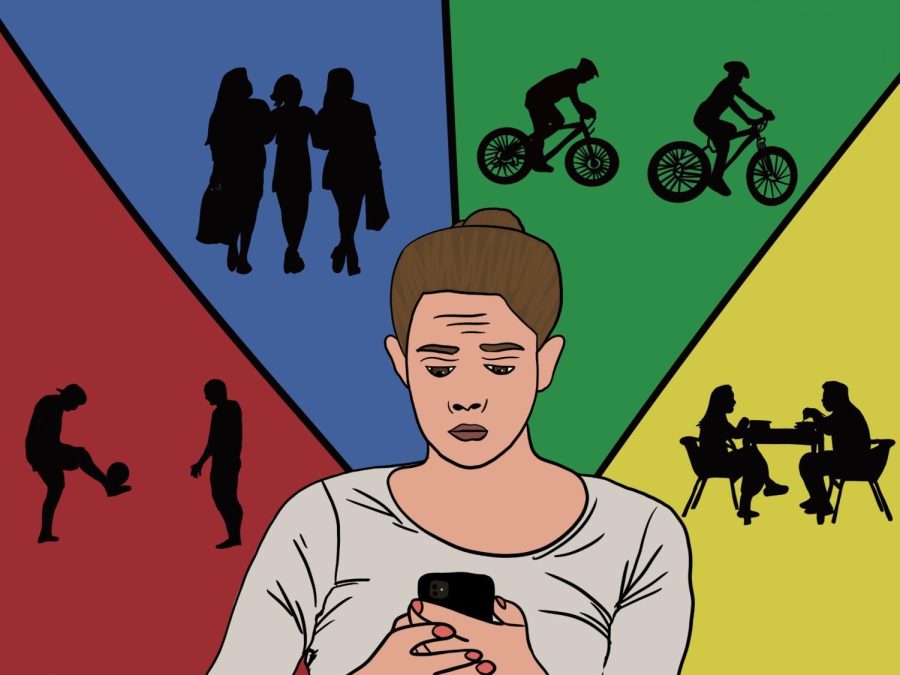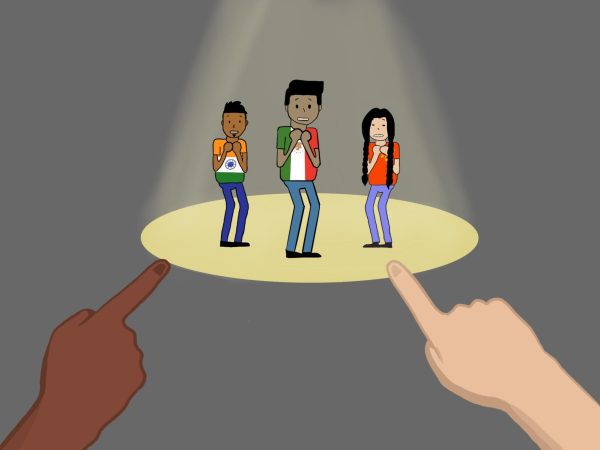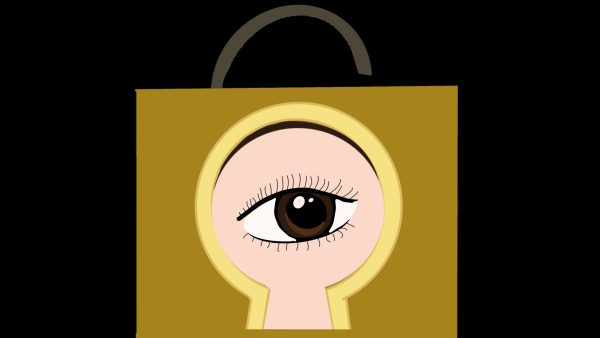What about me?
Digital illustration showing a high schooler experiencing fear over missing out on social events with friends, more commonly known as “FOMO.”
It is the middle of summer, and there is still one nagging thought continuing to cross my mind: “Why are my friends always together and never with me?” This thought, it turns out, is actually a form of anxiety that causes an overwhelming fear of missing out, also known as FOMO. For most who struggle with this, there is a common feeling that your social life can never be enough.
FOMO tends to flare up in the summer for reasons other than simply less homework to take up your time. Kari D’Amato, an Intake Specialist & Clinician at Renew Counseling, a therapy center in Olathe, described FOMO’s relevancy in the summer. She said she believes it becomes more relevant due to the lack of pre-scheduled school activities and the additional time spent on social media.
There is also the added fact that many students take some form of a vacation over the summer, keeping them from their typical social circles for longer periods of time. Vacations, especially during summertime when they are more frequent, can prompt additional feelings of FOMO. For example, when I see that my friend has gone on vacation, I become worried she will not want to see me afterward since vacations are so cool, even though I know deep down a vacation and myself are not comparable.
There is the other side to vacation FOMO, which is when I go on a trip. All I can think about when I am away are all the fun activities my friends are doing while I am away. The other thing is too that sometimes these fears can be confirmed by the images I see on apps like BeReal and Snapchat. This causes me to feel the same anxiousness I do when the roles are reversed. FOMO plays a big part in my life and others’ lives, especially with all of the technological factors at play in this day and age. However, it is still possible to prevent these feelings from causing you to spiral when your anxiety becomes too much to bear. Associate Director & Group Clinician Katie Frits at Renew Counseling said that being able to recognize symptoms is half the battle, because once you do, you can use therapy or other resources in order to prevent the occurence from getting out of control.
Shoreline Recovery Center located in San Diego explained many common symptoms to look out for. Some examples they included were “always saying ‘Yes,’ high social media activity, fast paced lifestyles, strong concern about others’ opinions and the urge to be surrounded by others.”
Knowing basic borderline symptoms of FOMO is a great start because you can get an idea of if or how you suffer from FOMO. You can also work on figuring out defusion exercises to de-escalate your anxiety before it gets out of hand. Being able to turn to a loved one or someone you trust and asking for help is the next big step to getting your summer and social life on the right track.
FOMO is difficult, and the hopelessness and anxiety that can start to take over your mind can be extremely hard to deal with. Despite this, I believe that just because our world is largely online, does not mean we have to give in to the stress and insecurity of the internet. Summer is short, so hangout with the people you want, not the people you think the internet wants to see.

Harper is a senior and a writer for the “The Express.” This is her second year on staff. Outside of newspaper, Harper runs track, plays high school soccer, and manages the football and basketball teams. In her free time, Harper enjoys watching horror movies, going to Quiktrip, and late-night car rides. Harper is excited to spend her final year writing for “The Express” along with her best friends.

Prajwal is a senior and Sports Design Editor for “The Express.” This is his second year on staff. Outside of newspaper, Prajwal is a clarinet section leader of the Howlin’ Husky Marching Band and plans to participate in various clubs throughout the year. Prajwal enjoys hanging out with friends, rooting for the Packers, and watching movies with family. He is excited to express his creativity as a designer and editor!











